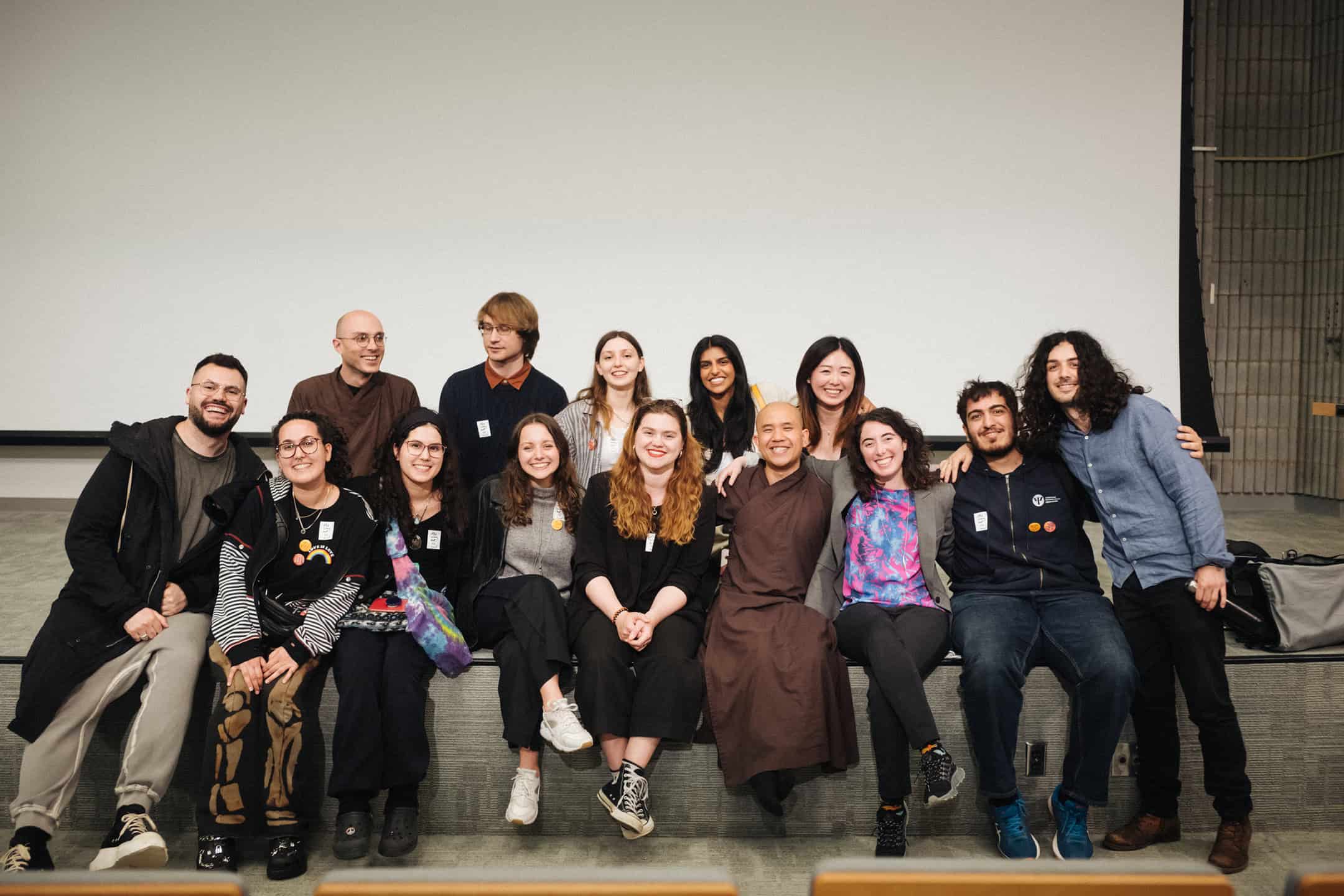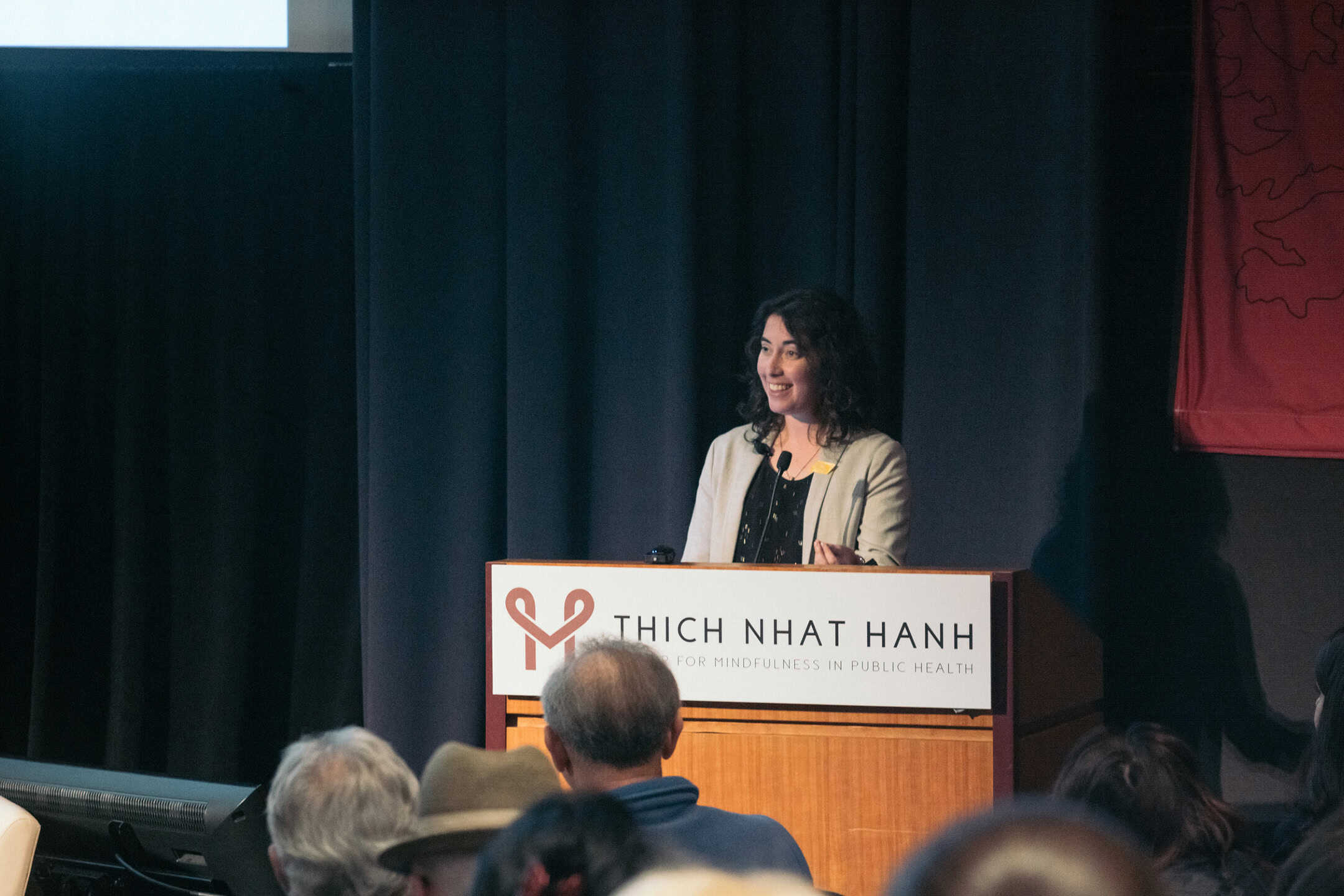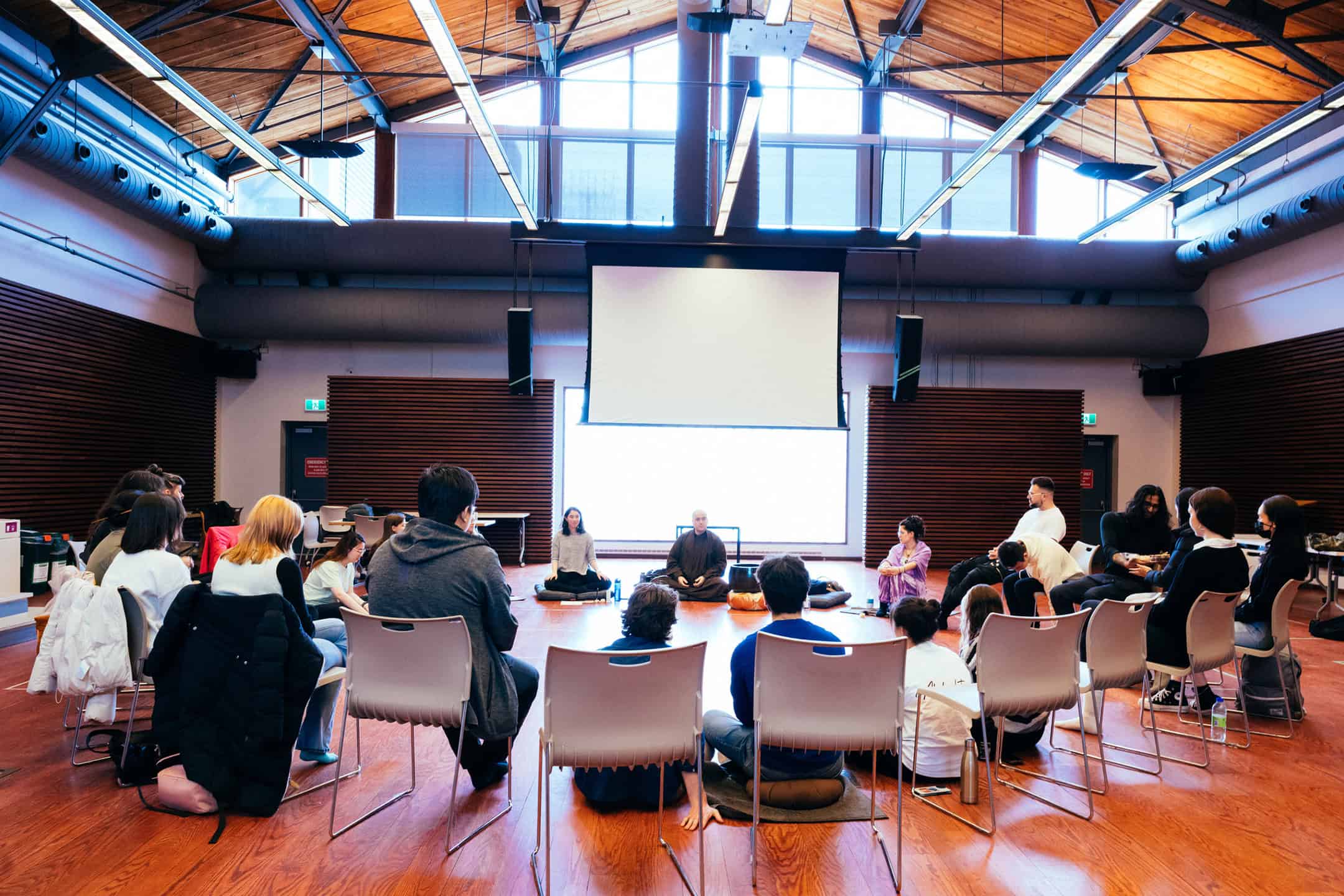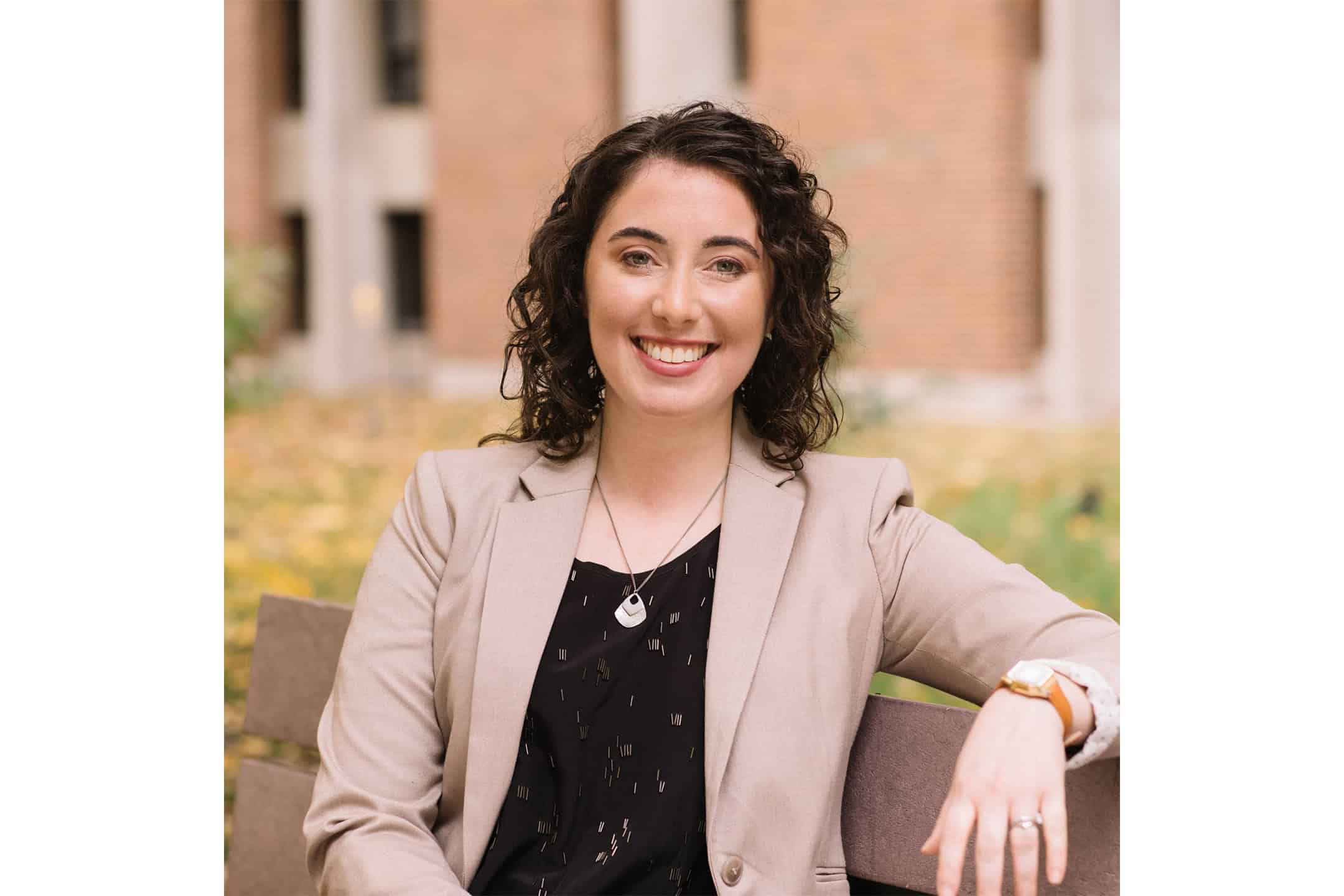From its seat at the confluence of science and spirituality, mindfulness meditation has grown exponentially popular lately. We’re told that it can make us happier, kinder, and sharper people — but what does ‘mindfulness’ even mean, and what can it teach us about how to better live our lives?
I sat down with Professor Elli Weisbaum from U of T’s Buddhism, Psychology and Mental Health department to answer these questions. Trained in Vietnamese monk and Zen master Thích Nhất Hạnh’s tradition of socially-engaged Buddhism since teenagehood,Weisbaum currently researches mindfulness interventions in healthcare.
As we discussed her work, I was struck by the nature of her gaze. Both piercing and placid, Professor Weisbaum’s eyes somehow looked at, into, and through me, but always accompanied by a genuine warmth suffusing her smile.
Shebonti Khandaker, The Varsity: Despite the excitement around mindfulness, its definition is contested and most people don’t quite know how it works. Could you tell us about that?
Elli Weisbaum: The concepts of mindfulness are rooted across many cultures and can’t be attributed to any one entity, but my work draws upon teachings grounded in Buddhist practice. Although there are many definitions, I like the description of mindfulness as an observational awareness of our present experiences.
In terms of the ‘how,’ mindfulness is evidenced to cause structural and functional changes in your brain. I share this phrase in classes: “where attention goes, neural firing flows and connection grows.” It’s like mental fitness: the same way different gym exercises train certain muscles, mindfulness — purposefully directing attention somewhere — strengthens certain brain areas. So if someone’s interested in growing more compassionate, evidence for Loving-Kindness meditation shows practical ways to do that!

TV: What is the present-day imperative for mindfulness? More than ever, why are people interested now?
EW: We’re facing a polycrisis of climate change and mental health challenges. There’s a sense of despair that comes from this, but I find hope in the wider recognition of the importance of mental wellbeing. This awareness also motivates interest in the intersection between mental and planetary health: we see more than ever that our systems are connected.
TV: Critics of contemporary mindfulness often highlight its divorce from its Buddhist origins. Some say meditation is impoverished by its removal from ethical imperatives to be loving toward all living things. Can you speak to the necessity for an ethical framework in meditation practice?
EW: From my understanding of Buddhist history; compassion and kindness are core to the practice. If I’m meditating but berate myself for messing up, I’m not activating the neural mechanisms of mindfulness. From a research perspective, these compassionate attitudes are necessary for the benefits of mindfulness like stress reduction.
The cool thing is, studies indicate that caring for ourselves changes how we engage with the world. Nobody exists in isolation; our actions impact ourselves and the world around us. So if you feel overwhelmed right now, care for yourself. Self care is enough already — but what does that allow you to do in the world?
TV: In discussing topics like burnout and mental health, we acknowledge that structural qualities of our institutions foster suffering. Mindfulness interventions are just that — interventions, right? What can be done here to create larger systemic changes, as opposed to intervening when systems inevitably hurt people?
EW: We don’t want to put the burden of burnout onto the individual. We need to recognize that systems can cause harm and saying you should ‘fix it yourself’ isn’t safe or reasonable. What interests me is mindfulness’ recognition that individuals and systems aren’t separate, but interacting parts of an ecosystem.
Socially-engaged Buddhism positions mindfulness as a way of caring for oneself and others in the pursuit of systemic change. Cultivating love within myself lets me extend it to my spheres of influence and each person can practice that within their own spheres. I’ve seen real change through these practices in who we are and how we interface with our communities.

TV: A lot of discourse around mindfulness focuses on its quantitative benefits. However, its roots are inherently spiritual. How should the average practitioner reconcile this divide? Is spiritual deepening something we look for each time we meditate, or is it a niche goal for non-secular meditators?
EW: Many find meditation because they’ve heard it reduces stress and anxiety, which is awesome. But limiting meditation to these benefits limits our experience of the phenomena. Language is limited, and to give language to lived experience is almost impossible.
Hạnh tells this story about his hermitage in the woods: one day, he forgot to close the windows when leaving. When he returned, the wind had blown out the fire and scattered his papers. So he went in, slowly closed the windows, organized the papers, and relit the fire.
When we start practicing mindfulness, it’s just like that story.
Mindfulness teaches you how to come home to yourself. The first step is like walking into that cabin. If we haven’t cared for our cabins, there may be a mess at first. If you try mindfulness, don’t say it didn’t work if you discover you’re a mess inside! Often, that’s where we start. If someone’s trying it for the first time, they might think it’s made them more anxious. But maybe mindfulness just made them more aware of what was there.
TV: What do you find when the home is clean?
EW: When we’re not caught in the attentional flow of our worries and fears, we can see clearly what’s there. When you can see who you are and how connected you are to the whole universe, you sometimes have this kind of… opening. It’s hard to describe the connection to things beyond yourself which is found through stillness.
TV: I find this mess analogy interesting, because popular understandings of Buddhist meditation presuppose that human suffering comes from hunger or desire. But to what extent are mess and desire inherent to the human condition? Do we engage in a harmful stigmatization when we practice distancing ourselves from them?
EW: The idea that mindfulness asks us to detach ourselves from desire is inaccurate. The teachings don’t embody a good or bad binary, but an attitude of embracing and carefulness.
Seeking positive feedback is part of being human. But what does my desire indicate, and what actions do I take accordingly? Desire tells me there’s something I want here and I should look into it. That’s not bad, it’s fun! With things like sexuality which can be shamed in society, we don’t want to turn our desires off, but to ask, “What is a skillful expression of this? How do I infuse my actions with the orientation of curiosity, kindness, love and care?”

TV: This reminds me of a paper you discussed in class for BPM438 — Mindfulness Meditation: Science and Research on Loving-Kindness Meditation, “Empathy and compassion.” It beautifully distinguishes between empathic distress and compassion, where the former is an untrained, painful response that encourages retreat, and the latter is the mindfully-trained response of recognition and a desire to help.
EW: Exactly! It’s about gaining the skill to self-regulate when challenges take us offline. If we can’t prevent getting overwhelmed by others’ suffering, we collapse too. We need tools to digest challenges in a safe way that encourages compassion for ourselves and others. We’re not training to never be upset. We’re training our resilience: what to do when difficult things inevitably happen to us.
TV: Speaking of ‘offline,’ endlessly scrolling through online news online can be a major source of empathic distress for many. Simultaneously, back to the issue of hunger, we’re increasingly primed to consume more and more stimulating digital content. Can mindfulness teach us to address these technological challenges?
EW: Attention is a huge commodity, right? People vying for our attention are taking something that belongs to us. How do we take back our agency? Some of my own anxiety comes from ‘doom scrolling.’ Yet, it’s important to know what’s going on in the world. If we put our heads in the sand, we’re not standing up for things that matter.
Recognizing the impact of social media is itself a mindful act. If you don’t stop and look, you won’t realize how you’re being pushed and pulled by your phone. Mindfulness helps in making thoughtful choices about technology, like “I want to know what’s going on in the world, but I’m limiting myself to this much [news] reading.” These skills can calm our nervous systems enough to recognize the stimuli impacting us.
TV: What do you mean ‘calm’ our nervous systems?
Weisbaum: From a scientific perspective, with difficult stimuli like an angry text or bad grade, the body receives information and responds accordingly. The Buddhist teaching of the Four Nutriments looks at what we consume beyond edible foods — conversations, news, even the vibes of a room. Like what we eat, this consumption affects our bodies.
With the mindfulness framing, we ask how these affect your nervous system. The system in your body that prepares you for fight-or-flight might be triggered by things like social media which overwhelm us, agitate us, and even harm our sleep. So when we say caring for your nervous system, we’re recognizing the inputs we’re consuming and looking after ourselves accordingly.
TV: Which returns us to the idea of learning to live with uncertainty.
EW: Exactly — we aren’t practicing mindfulness to prevent fear or anger. We’re not saying we shouldn’t be messy, complex creatures. I’m problematic and messy all the time! We’re practicing it to meet ourselves in these states with kindness and openness. It’s not about avoiding or suppressing, it’s a philosophy of turning towards and embracing.
This interview has been edited for length and clarity.



No comments to display.